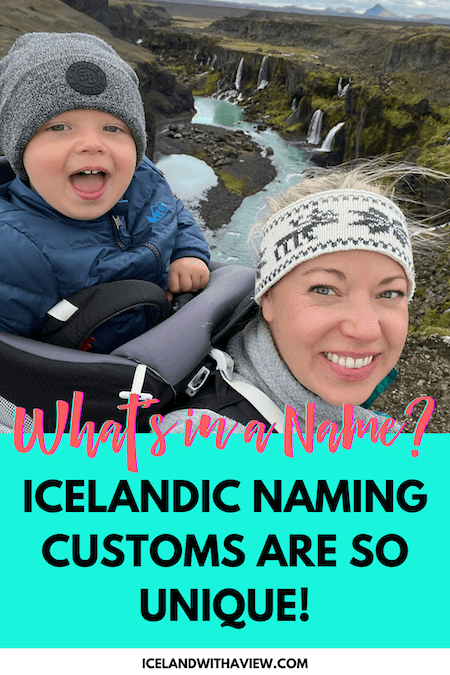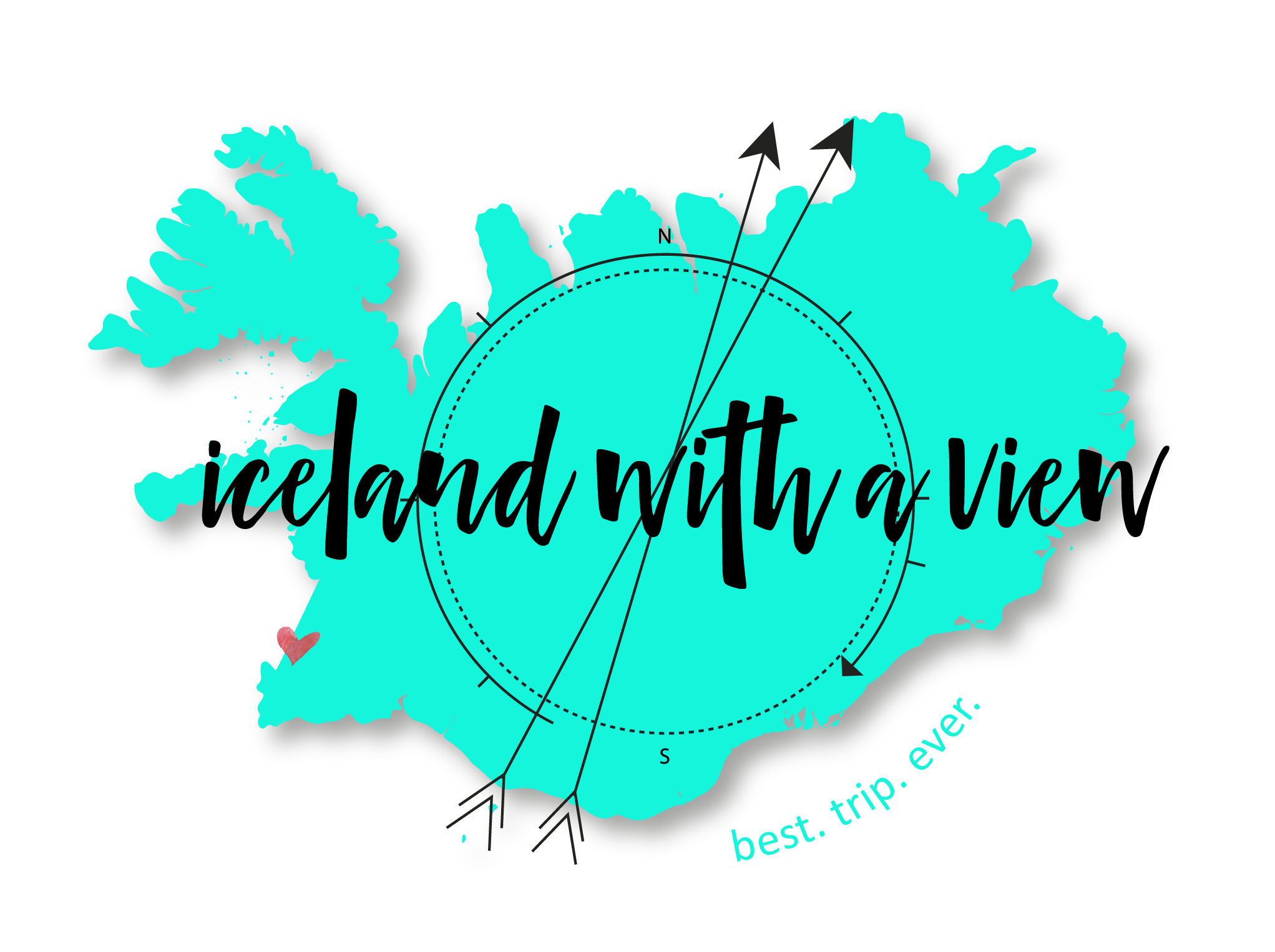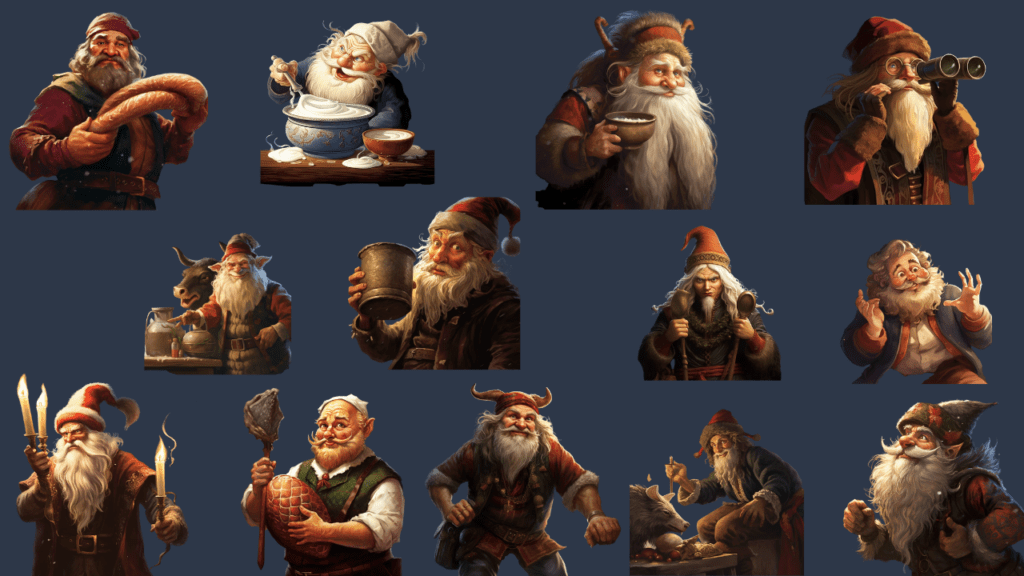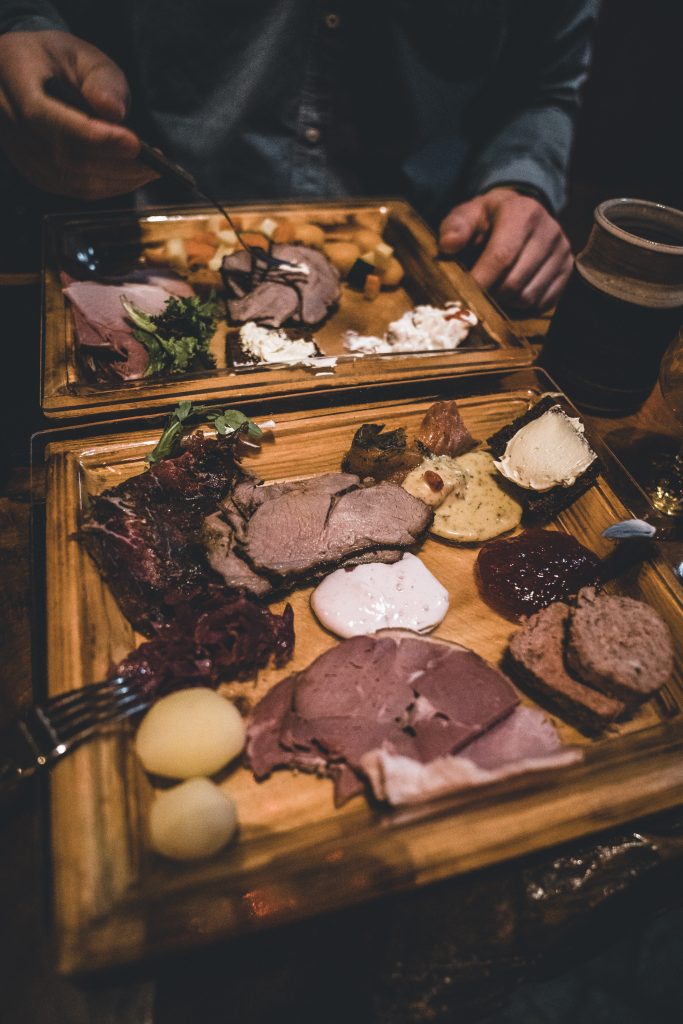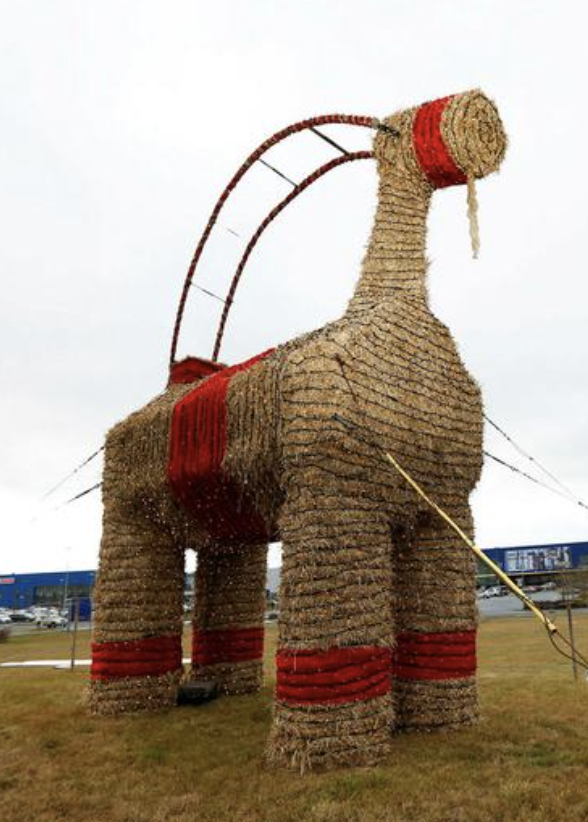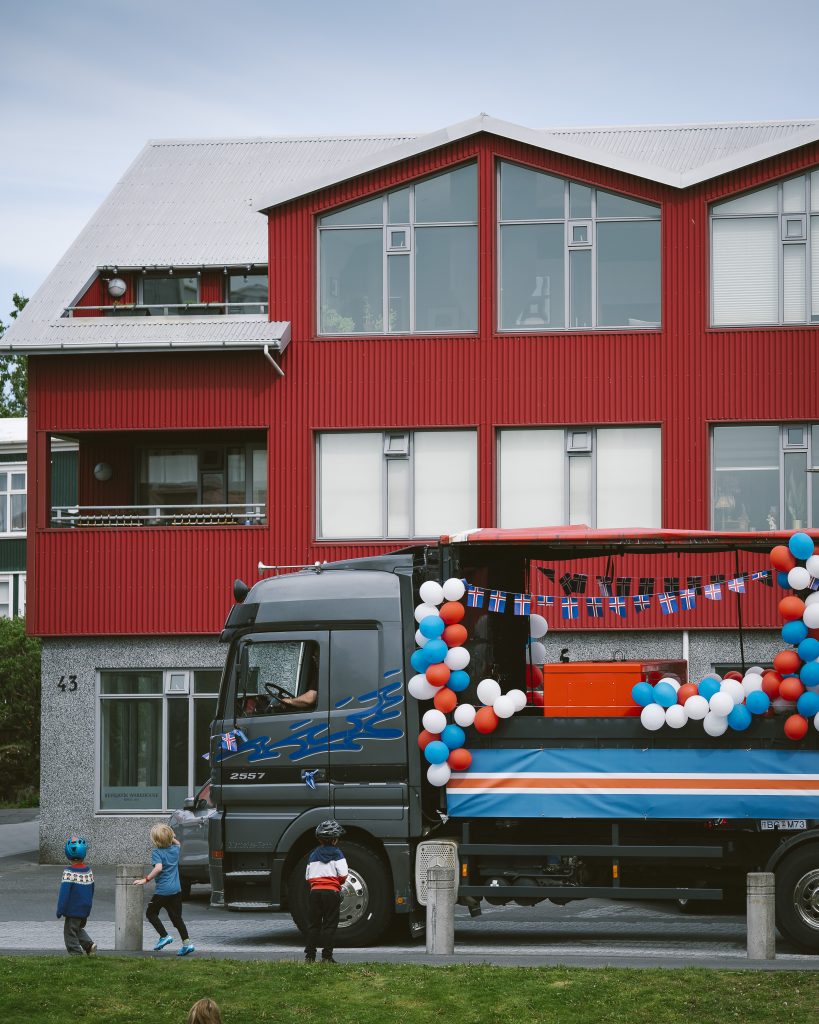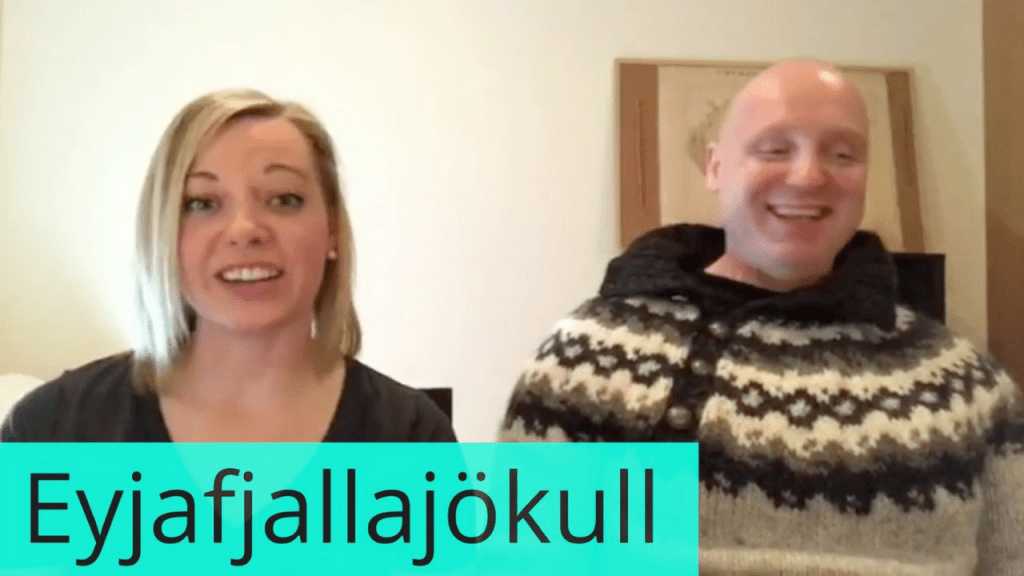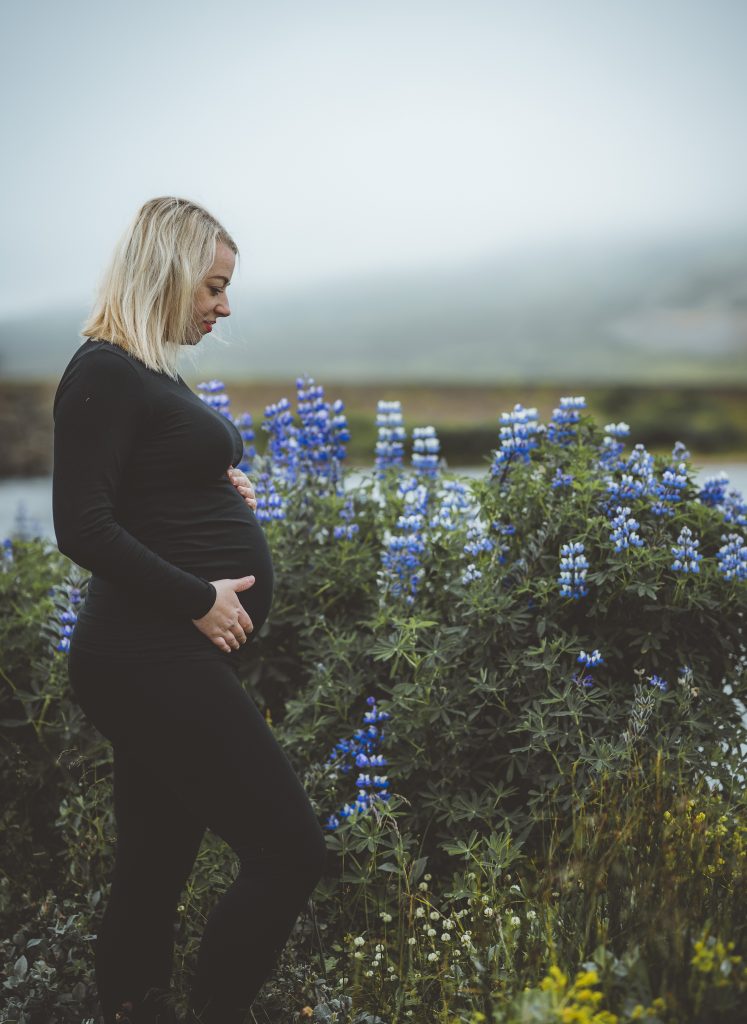Have you ever wondered where names in Iceland come from?
When we found out we were moving here, a friend gave me the perfect going-away gift.
It was a coffee mug with “Dr. Buckleysdóttir” written on it and a picture of Iceland.
(Buckley is my dad’s name, and dóttir means daughter, so it’s a nod to the way names in Iceland work – very clever!)
I’d been telling her how Icelandic names follow some fascinating patterns, but at that time, I honestly didn’t know half of it!
When we arrived here I realized I had a lot to learn about this naming system.
I was still working as a chiropractor at the time. I was confused and often mixed people up, especially when seeing patients!
So, if you’ve ever wondered how Icelanders get their names, wonder no more!
Here are five common naming rules used in Iceland.
Table of Contents:
Icelandic Naming Traditions
The Iceland naming convention follows some pretty unique rules that might surprise you!
Iceland surnames don’t just sound different, they actually follow a specific structure that’s deeply rooted in Icelandic culture.
Let’s check out how the names in Iceland work!
1. Last Names in Iceland: Son and Dóttir
Dóttir meaning: Daughter
Son meaning: Son
The Icelandic naming system works slightly differently than you might be used to.
Instead of traditional Icelandic last names being passed down for generations, Icelanders use a unique system based on their parents’ first name.
Here’s how it works: if your dad’s name is, say, Johan, and you’re a boy, your last name would be “Johansson” (literally “Johan’s son”).
If you’re a girl, the ending of the Icelandic last name is dóttir. It would be “Johannsdóttir” (“Johan’s daughter”).
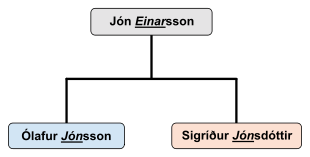
Pretty different, right?
Family names in Iceland: Only around 5 – 10% of Icelanders have a fixed family name that everyone shares, but that’s pretty rare. This surname would come from parents of foreign origin.
And even then, if a couple gets married, the wife doesn’t have to take her husband’s last name.
Children in these families can still choose either parent’s name as part of their own last name, so the idea of everyone sharing a single family name isn’t really a thing here.
To compare, in the U.S., it’s typical for children to take their father’s last name, and if a couple gets married, the wife often adopts the husband’s last name.
As for Icelandic last names, they keep it pretty simple (and personalized!). Most of the time, your last name is based on your dad’s first name, or sometimes your mom’s if you prefer.
The Icelandic naming system is just one of those cool, unique things that makes Iceland stand out.
It’s fascinating how cultural traditions, everything from naming customs to local cuisine, give us such deep insights into Icelandic life.
And speaking of traditions, food is one of the best ways to truly understand a culture!
If you’re interested in exploring more of Iceland’s rich heritage, consider joining the Reykjavík Food Walk Tour.
It’s one of Iceland’s highest-rated tours for good reason.
You’ll not only discover delicious local cuisine but also the stories and traditions behind each dish at hidden gems you might otherwise miss.
Use the VIP code: ICEVIEW for a 10% discount when you book!
2. Iceland Second Names
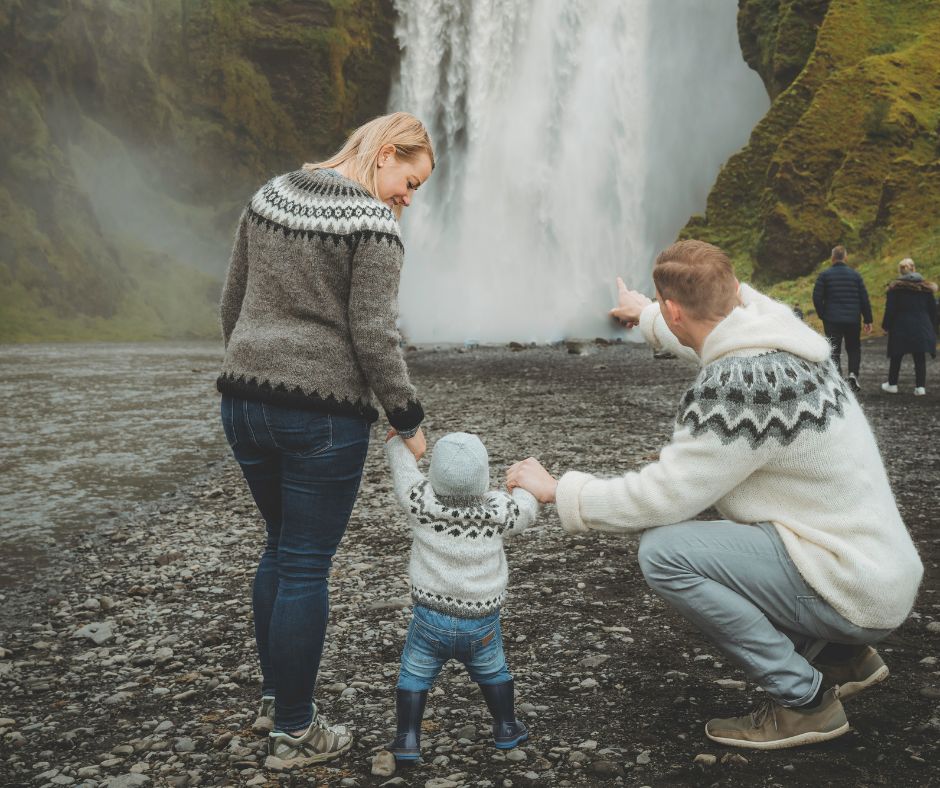
In Iceland, it’s really common to use both a first and middle name together, almost like they’re one name.
So, if you’re booking an appointment or signing up for something, you’re likely expected to give both names, not just a first and last like we might do elsewhere.
For example, someone named “Anna María Jónsdóttir” is probably called “Anna María” all the time, not just “Anna.”
Parents often use both names when calling their children, especially if they want to get their attention!
Another cool thing about Icelandic names is the tradition of honoring family members.
It’s super common to name kids after relatives, so you’ll often see a few people in a family with the same first name.
Sometimes, they’ll even tweak the name to fit the child’s gender, like giving a grandson a version of his grandmother’s name.
Icelandic names and meanings are just one example of the country’s unique culture.
Want to learn more? Check out this blog post about Icelandic culture.
➡️ READ: 10 Interesting Facts You Don’t Know About Icelandic Culture
3. Nameless Newborns
In Iceland, picking out a name for your unborn child isn’t a common practice.
In fact, babies here are often nameless for months after birth!
Parents have up to six months legally to name their baby, and during this time, it’s typical for the little one to go without a name.
Usually, the name isn’t revealed until their official naming ceremony and even close family members don’t know!
Until then, newborns are often called drengur (boy), stúlka (girl), or elskan (which means “my love” or “sweetheart”).
The naming ceremony itself is a big event in Icelandic culture.
Friends and family gather to celebrate, and it typically takes place once everyone’s had a little time to rest and settle into life with the new baby.
Of course, just because a baby is only officially named 6-8 weeks after birth doesn’t mean parents don’t have a few names in mind.
They often have an Iceland names list picked out ahead of time, waiting to see which one feels right.
This is one of the more interesting cultural differences I’ve found when moving to Iceland. But I can definitely see the value in it!
What if your baby arrives, and the name you had picked out just doesn’t fit?
Take a look at the video below where I answer some of the most frequently asked questions about Icelandic culture. 👇
4. The Icelandic Naming Committee
There are some pretty strict rules around naming your newborn baby.
If you’re choosing Icelandic male/female names, there shouldn’t be any issue. But keeping with Icelandic tradition, if names in Iceland haven’t previously been used, they have to be submitted to the Icelandic Naming Committee for approval.
The name may contain only letters from the Icelandic alphabet, and must fit grammatically within the language.
The reason is to keep Icelandic culture.
This is so different from what I’m used to in the United States, where people can name their children whatever they want, like Apple or North!😂
Planning a trip to experience Iceland’s unique culture for yourself?
Whether you’re visiting in summer or winter, packing for Iceland requires some careful preparation.
I’ve put together a comprehensive guide to help you navigate Iceland’s distinctive weather patterns and terrain.
Download your FREE Ultimate Iceland Packing Guide below to get detailed checklists for clothes, electronics, and documents, plus a layering cheat sheet and expert packing tips!
Download your FREE PDF below!👇
5. Iceland’s Telephone Directory
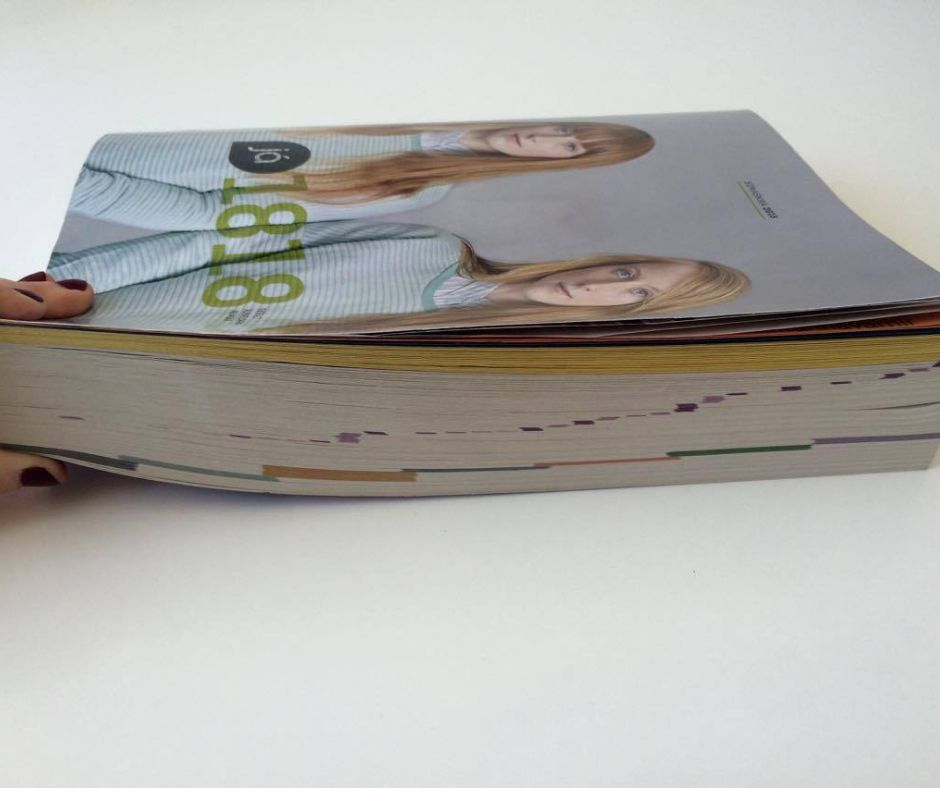
Because of Iceland’s unique naming system, the phone book here is actually organized by first names instead of last names.
So rather than looking up “Anderson, John” under “A,” you’d jump straight to “John” under “J.” It’s a totally different setup than what most people are used to!
There’s only one phone book for the whole country, and it’s about two inches thick, listing everyone by their first name.
Since it’s common to name kids after relatives, names in Iceland can get pretty repetitive within families, meaning you’ll find a lot of people with the same first name.
For example, I have a friend named “Peter Peterson,” and his dad’s name is also “Peter,” so they share the exact same name!
But instead of using “Sr.” or “Jr.” like you might see elsewhere, Icelanders add details like occupations in the phone book to help tell people apart.
6. First Name Basis
Before I became a full-time Iceland travel expert, I was a chiropractor in the States.
I spent years studying, training, and working hard to earn the title of “Dr.”
It was something I was really proud of!
So, when we first moved to Iceland, my employer handed me my new business cards with just my first and last name on them.
Confused, I thought, “Hey wait a minute! What about the ‘Dr.’ part?”
You see, back in the States, the moment I walked across the stage at my chiropractic graduation, I was thrilled to finally be called “Dr. Jeannie.”
Every time a patient at work would call me “Doc,” it reminded me of all the hard work that went into becoming a chiropractor.
All those years and countless hours of study had to count for something!
But not in Iceland. Here, everyone goes by their first name, even medical doctors and government officials.
It’s considered polite to call people by their first names in Iceland.
You know that’s just it’s just the way it is here. No one is more important than the other person – even the president!
I think that’s pretty cool and says a lot about Icelandic culture.
Keep Up With Everything Iceland
As you can see, Icelandic naming traditions are full of surprises, from the “son” and “dóttir” system to the unique role of the Naming Committee.
These are just some of the things that make Iceland so special.
Interested in finding out more about Iceland’s unique cultural traditions?
💥Sign up for my FREE newsletter and get the latest Iceland updates, upcoming events, exclusive discounts, insights into Icelandic culture and front-row seats to live Q+A’s and planning tools.
In Iceland, there’s always something new to discover.
Happy planning,

Pin it for later! 👇🏼
